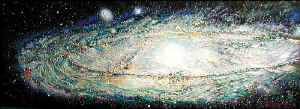
"There is not a single aspect of the eighty-four
thousand sections of the Buddha's teachings which is not contained in Avalokiteshvara's
six syllable mantra "Om Mani Padme Hum", and as such the qualities
of the "mani" are praised again and again in the Sutras and Tantras....
Whether happy or sad, if we take the "mani" as our refuge, Chenrezig
will never forsake us, spontaneous devotion will arise in our minds and the
Great Vehicle will effortlessly be realized."
Dilgo Khyentse Rinpoche
-- Heart Treasure of the Enlightened Ones
People who learn about the mantra naturally want
to know what it means, and often ask for a translation into English or some
other Western language. However, Om Mani Padme Hum can not really be translated
into a simple phrase or even a few sentences.
All of the Dharma is based on Buddha's discovery that suffering is unnecessary:
Like a disease, once we really face the fact that suffering exists, we can look
more deeply and discover it's cause; and when we discover that the cause is
dependent on certain conditions, we can explore the possibility of removing
those conditions.
Buddha taught many very different methods for removing the cause of suffering,
methods appropriate for the very different types and conditions and aptitudes
of suffering beings. For those who had the capacity to understand it, he taught
the most powerful method of all, a method based on the practice of compassion.
It is known as the Mahayana, or Great Vehicle, because practicing it benefits
all beings, without partiality. It is likened to a vast boat that carries all
the beings in the universe across the sea of suffering.
Within the Mahayana the Buddha revealed the possibility of very quickly benefiting
all beings, including oneself, by entering directly into the awakened state
of mind, or Buddhahood, without delay. Again, there are different ways of accomplishing
this, but the most powerful, and at the same time the most accessible, is to
link ones own mind with the mind of a Buddha.
In visualization practice
we imagine ourselves to be a Buddha, in this
case the Buddha of Compassion, Chenrezig. By replacing the thought of yourself
as you with the thought of yourself as Chenrezig, you gradually reduce and eventually
remove the fixation on your personal self, which expands your loving kindness
and compassion, toward yourself and toward others, and your intelligence and
wisdom becomes enhanced, allowing you to see clearly what someone really needs
and to communicate with them clearly and accurately.
In most religious traditions one prays to the deities of the tradition in the
hopes of receiving their blessing, which will benefit one in some way. In the
vajrayana Buddhist tradition, however, the blessing and the power and the superlative
qualities of the enlightened beings are not considered as coming from an outside
source, but are believed to be innate, to be aspects of our own true nature.
Chenrezig and his love and compassion are within us.
Chenrezig: The Embodiment of Compassion
In doing the visualization practice we connect with the body and voice and mind
of the Buddha by the three aspects of the practice. By our posture and certain
gestures we connect with the body, by reciting the words of the liturgy and
by repeating the mantra we connect with the voice, and by imagining the visual
form of the Buddha we connect with the mind.
Om Mani Padme Hum is the mantra of Chenrezig. In the words of Kalu Rinpoche,
"Through mantra, we no longer cling to the reality of the speech and sound
encountered in life, but experience it as essentially empty. Then confusion
of the speech aspect of our being is transformed into enlightened awareness."
That enlightened awareness includes whatever we might need to understand in
order to save any beings, including ourselves, from suffering. For that reason
the entire Dharma, the entire truth about the nature of suffering and the many
ways of removing it's causes, is said to be contained in these six syllables.
Om Mani Padme Hum
"Buddha of great compassion, hold me fast
in your compassion. From time without beginning, beings have wandered in samsara,
Undergoing unendurable suffering. They have no other protector than you. Please
bless them that they may achieve the omniscient state of buddhahood.
With the power of evil karma gathered from beginningless time, Sentient beings,
through the force of anger, are born as hell beings and experience the suffering
of heat and cold. May they all be born in your presence, perfect deity."
The Meditation and Recitation of Four-Armed Chenresig